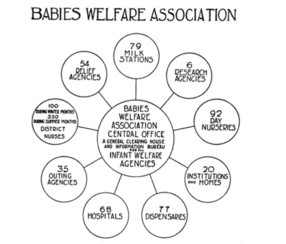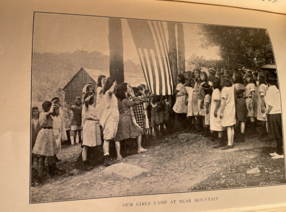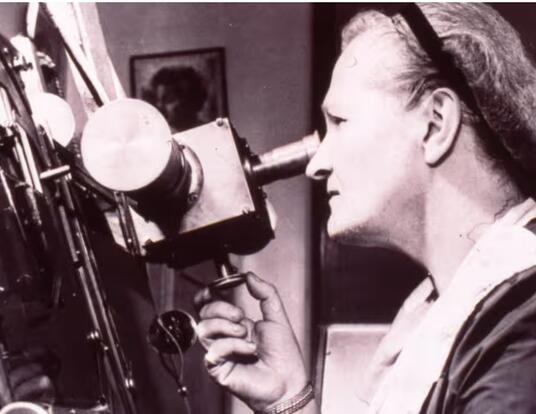Colloquy Podcast: The Dark History of Eugenics Behind the Dobbs Decision

"A victory for white life." That's how Illinois Congresswoman Mary Miller described the Supreme Court decision overturning the constitutional right to an abortion at a rally with former President Donald Trump last June. Miller, who had quoted Hitler in a previous speech, later said that she had meant to say "right to life."
Jamie Marsella, a Harvard PhD candidate in the history of science, says that in historical terms, Miller's distinction doesn't make much difference. Looking back over a century to the Progressive Era, she finds that maternal and reproductive health policies were driven by racial imperatives. President Theodore Roosevelt, for instance, saw declining birth rates among white people as the country's greatest problem and spoke publicly about, quote, "race suicide.” Marsella joins us on Colloquy to discuss the American ideal of motherhood, its history, and its echoes in the Dobbs decision and renewed wrangling over reproductive freedom.
This transcript has been edited for clarity and correctness.
I'm curious about abortion in American history. Were abortion and contraception big issues before the Progressive Era?
For most of United States history before the late 19th century, abortion and contraception, which in many places and times were sort of understood to be about the same thing—were very commonly practiced, perhaps not as commonly discussed, but very frequently practiced. Not really stigmatized.
And I think something to keep in mind is the religious element of antiabortion sentiment is not a part of the conversation, even in the first wave of criminalization of abortion in the late 19th and early 20th centuries. That is about fears of race suicide, white supremacy, and concerns about the overpopulation of the “undesirable people" versus white Anglo-Saxon Protestants. And in that regard, religion is sort of conflated with race and ethnicity more than it is about any sort of theological belief.
And then later, that changes. And one of the reasons why this changes, which I think gets to your question, is because technology changes. So for most of United States history before the 19th century, pregnancy tests didn't exist. There was very little evidence for pregnancy before what they would call the quickening, all right? Because of course, people would start and stop menstruating for various reasons. It was not—you were not assumed to be pregnant until you felt the quickening, which means when the fetus is moving inside the uterus and you can feel that. And so, up until that point in the pregnancy, you could be "bringing on the menses," quote-unquote. There are different herbal remedies or things that you could do that would do that, and that was not really a stigmatized practice.
But as technology develops, of course, you can begin to develop rhetoric about the right to life. You can start arguing about the role of the fetus in a much more specific way. And so like we're seeing now, debates about viability—those debates are becoming more and more complicated to argue because, of course, we have technology that can keep a fetus alive earlier and earlier and earlier. And that is a very different conversation than one about a woman's autonomy and bodily choice and health decisions. And so those sorts of conversations get very complicated very quickly because of this technology and the way that we're understanding fetal life in the first place. It's very, very different from the time that I'm looking at in the Progressive Era when there was no way to validate a pregnancy that early in pregnancy at all.
Is the Progressive Era or a short time before it really the first time that abortion becomes criminalized in a widespread way?
In the United States, yes. The first—it goes state by state, starting in the late 19th century. By 1910, I believe, it's criminalized across the country. And this is directly in response to fears over specifically Catholic reproduction and the idea that there was an increase of Catholic immigrants. They were reproducing so much more than, quote-unquote, "desirable" Anglo-Protestant women. And so that if this was to continue, over time, they would overtake.
You know, it sounds a little bit like the great replacement theory that you hear in the news today. It's that they will overtake the country. And so these laws were designed to prevent Anglo-American, Anglo-Protestant women, from deferring childbearing for going to college or to defer families at all as they start their careers. These laws were very concerned with that and not really at all about religion or fetal life.
In some of your writings, you talk about the republican ideal of motherhood. What is this notion? Where does it come from?
When you talk about it in the United States context, we're usually referring to an idea that came out of the Revolutionary Period. And it's this idea that women were able to serve. They were absolutely essential to the Democratic project that was coming out of the Revolution because they were the ones who were birthing and raising the children who would become future citizens. So in this way, theoretically, women could argue that they were absolutely crucial to the American project.
But of course, this has some very obvious drawbacks because they're asserting their worth to government, to politics, in their reproductive functions. And so what you see over time is that ultimately, this logic is used to assert that women should be kept in—well, you hear often "the private sphere." They're kept in domestic spaces. They should not be participating in public, political, or economic life.
And also, of course, this is about very specific women, right? Because many historians have shown that most women had to work to sustain themselves and their families. And from the Revolution until the end of the Civil War and later, women were forced to work because they were enslaved, so this only applied to a very specific group of privileged, elite women. But by the time you get to the late 19th century, the Progressive Era, these same women are arguing that they should be able to go to colleges, that they should be able to enter these elite professions.
And so you see this idea linger but be transformed into a new understanding that because women are so—they're so uniquely maternal, they're so capable of cleaning up messes. They're capable of nurturing. They should be allowed in certain capacities to enter the public space to do child welfare work or social work and that is something that they're uniquely qualified to do. And so you see this rise of nurses and doctors, public health professionals, social workers, settlement house workers. They're all using what's understood as maternalism. They're using this understanding to justify their places in public economic and political life.
You've alluded to xenophobia as a motivation for the concern around declining birthrates. I wonder to what extent [the concern] was also a reaction to, for instance, the lead-up to women's suffrage.
I think they're definitely related. Often when you see feminist movements taking steam, you see a reciprocal backlash to the very feminist movement. We're seeing it now. We've always seen it. And I think, in part, so much of what—you mentioned Teddy Roosevelt in the introduction and the concept of race suicide.
And so much of that is grounded in this idea that these supposedly eugenic, desirable women are not taking on the responsibility that they have biologically, naturally, whatever terminology that they wanted to use, but that they were shirking their responsibilities by pursuing feminist pursuits, by pursuing suffrage. They were stepping out of their place. They were so focused on the right to vote that they weren't thinking about the real role that they have in fostering the nation, in being this mother to future citizens.
One of the frames for your research on the history of maternal health policy is eugenic maternalism. Can we just take a moment here to break down what you mean by that and where you find it in this period?
When people think of eugenics, they often associate it with World War II and Nazism, and so it's important to remember that eugenics has a very—a much longer life. It certainly is true that World War II and the atrocities of the Holocaust were deeply rooted in eugenics, but in this country and Europe, eugenics was very, very popular and very, very pervasive in many major institutions, especially at the beginning of the 20th century through—and I and many others would argue, well into today.
And so the eugenic maternalists that I look at really prioritized what is often called positive eugenics. And this was the idea that rather than sterilize someone or laws that came later that would prevent different races from marrying each other or procreating, they wanted to specifically create programs that would emphasize the right behaviors, the right practices, the right nutrition, the right sanitation, that would allow the supposedly more fit to propagate, to pass on better traits to their children, and to have a much more idealized lineage moving forward.
How does eugenic maternalism play out in one organization you studied in depth, New York City's Babies Welfare Association?
At its most basic, the Babies Welfare Association—I call it the BWA because it's quite mouthy—the BWA was an organization that was created by the city's Bureau of Child Hygiene. And the Bureau of Child Hygiene itself was a subdivision of the Department of Health for the city of New York. And so it's technically a government operation.
The government—the city’s Bureau of Child Hygiene—really served as a hub within the BWA. And then they solicited participation and collaboration from philanthropic and other private organizations in the city that did child care and maternity care. So there were over 120 organizations. They were things like milk stations that offered poor women free or discounted milk that would be free of taint or tuberculosis because that was a serious problem at the time. There were orphanages. There were day nurseries, which were basically child care centers.

There were organizations like the Visiting Nurses Association, which would send nurses into different tenement homes to help aid the sick or provide maternity care, do different studies. Metropolitan Life Insurance Company was a big part of this. They would create pamphlets on the best practices for child rearing and child care. And all sorts of different organizations that ended up making this up.
And so the BWA is fascinating to me because it's a great example to see how the government, which was so invested in a very particular standardized form of eugenic maternalism—they collaborated with the AMA, for instance, to make standardized scorecards that they would use for baby contests, which were a very popular form of entertainment at the time, to make sure that people were doing everything the same way and they were all getting their measurements taken. They were very focused on standardization like many Progressive Era organizations were.
But then they're collaborating with all these different groups who had previously sometimes been quite fraught—their relationships were quite fraught with each other. And how to get these different groups to practice child care, maternity care, and different forms of eugenic public health programming, in a standardized, similar way.
And so the relationship between these different groups shows these ways that they're negotiating their own roles, particularly Catholic and Jewish organizations because they're representing and devoted to communities that were—they were ethnic communities. They were white ethnic communities that would not have been considered eugenic by many people in the eugenic reform movement. And so figuring out whether or not a standardized eugenic program could accommodate Catholics and Jews and what that looked like and what Americanism looks like for all of these different groups is a big part of their project.
This is a moment where public health bureaucracy, the beginning of a welfare system—these things are all coming out of these movements, the key players within these organizations. And so it's essential to understand really what they were thinking and how they understood their work in the context of, yeah, eugenics because that has shaped the very foundations of many of our systems. And that's why today when you hear certain things in the news, the echoes are very clear if you know what to look for. There are real legacies that come from this eugenic moment. And I think one of the questions I get asked the most is, “Well, surely you're not mad that they're providing charity to these families?” And no, but it's important that they understood that this charity would make this family more American, and American really as a proxy for a certain kind of white person in this country.
And I think part of that is just recognizing that whiteness has been an unstable category and that American, being an American, what an American means, is also an unstable category. There's never really been one. And yet when I mention it, we all know what I'm talking about, and it's because of these sorts of programs that emphasized and educated people very specifically to act a certain way, behave a certain way, and look a certain way. And that all came out of this movement, in addition to many other movements, of course.
But is that eugenics, or is it cultural hegemony?
Well, because it is specifically about reproduction…it's the Babies Welfare Association. It's specifically about encouraging women. They did work with men and boys, but it was primarily about educating women on reproductive issues and child welfare issues and training them to be better mothers.
For instance, one of the programs that I'm most fascinated by is this concept called the Little Mothers League. And this was the idea that these young girls, sometimes as young as eight years old if their mothers were working, would be in charge of raising the younger children at home. And so the BWA was like, let's harness this power, right? Let's take these girls who are already raising children. We assume, of course, that they will be future mothers as well because that's their ultimate purpose. We're going to take them into these little clubs, kind of like Girl Scouts, and we're going to train them. We're going to bring in professionals and we're going to teach them how to care for baby. We're going to teach them how to become better mothers so that their children and the children they're currently raising, their siblings, will all be better citizens.

And so this emphasis on child rearing, childbearing—that is deeply eugenic, and the idea that these girls could be rewarded for demonstrating their worthiness as child bearers, as someone who could recognize the signs and symptoms of Americanness and then embody it in themselves, go home, teach their mother. Don't feed the baby pineapple. Don't do this or that. They could be these little ambassadors of an American ideal—that is also eugenic.
And so that, to me, is one of the best examples of this—the way that these sorts of ideas operated. It was like, let's go to the child. Let's get her while she's young. We'll train her to be this ideal mother. And then she can impart for the future generations.
But what's the genetic component of all this?
So I should have said this earlier, but at this time, in particular, this is 1900 to about 1920, the Mendelian version of eugenics that we're most familiar with—that is specifically about heredity being passed on from generation to generation, sort of innate, immutable, not changeable, that had not become the dominant form of eugenics. So at this particular time, there were competing ideas. And one of those ideas, which I think had traction, particularly in the eugenic maternalist capacity, is this idea that draws on Lamarck, and it's basically that if you can improve the circumstances of someone today, their offspring will be improved, and then that would be—they would not only know how to raise their offspring better, but that they would have better physical health and circumstances, and that the environment was just as important, if not more so than heredity.
And so for these women, many of them were very explicit in saying, like, yeah, of course, it would be great if we could limit undesirable people from even being born, but they're here now so we have to make them better. We have to do what we can so that their children will be better than they will be, and they will be better than they will be, and that's the role that they were playing. It wasn't clear to them at this time that environment was more or less important than heredity. This was still being debated. But for these women in particular, especially because they were justifying their own place as materialist performers who were drawing on their ability to nurture and child care, this idea that they could improve the environment and that had eugenic potential was central to the argument that they were making.
So let's bring it up to the present day. I started with that quote from Mary Miller, the Congresswoman from Illinois. To what extent do you see echoes of this eugenicism from earlier in the century in the loss of constitutional protections for reproductive health care from women and trans men?
I think the echoes are becoming screams. In part, I do think—we'll never know for sure if that was a slip-up or not, that quote about white life. But I think when you look at the record—because antiabortion advocates have been chipping away at abortion rights since Roe was decided. And so this sudden call for social services to provide care for women and children—it's a little too late because they've had 50 years to demonstrate their commitment to life theoretically by supporting a mandatory minimum wage or a federal living wage. They've had opportunities to expand Medicaid coverage for pre- and post-partum women. They've had opportunities to do free lunches in schools or food stamps, all these different things that have effects on the reasons why people decide to get an abortion because we've seen the studies, not only from this country but in other countries where abortion has been illegal—we know that in this country, in particular, women are most likely to get an abortion when they've already had children that they're worried about supporting because they're near or close to the poverty line and they're under- or un-insured.
And so there are so many things that could be done to prevent that. And those things are particular sticking points for the Republican Party often. In addition to things like preventing sex education in favor of abstinence, which research shows is ineffective. They often fight so that employers can decide whether or not they want to cover contraception in their employee health insurance, these different things that would make very real contributions to limiting people's desire for abortions. And we know that in places where abortion is legal, including in this country when it was—sorry, illegal, and in other countries, it doesn't prevent abortions. So if they were really committed to this cause, there are many fact-based ways to do that.
And to me, as a historian, so much of that conservative resistance to expanding social services and the welfare state is in part because you have to understand that the origins of our welfare state are grounded in this eugenic thinking. It was very much created for white women who had fallen on hard times and were considered to have been morally and sexually pure—widowed or abandoned. They weren't women who are having sex in ways that they shouldn't be having sex. They weren't women who were doing anything "wrong." They were people who deserved aid. And that was who it was for, and it was not for anyone else.
And so you see this resistance to these programs I think in part because they do benefit low-income women. They do benefit low-income women of color and children of color. And that, in particular, things that would lower the maternal mortality rate—these different things are just not being advocated for at all. But instead, they're advocating for a ban on abortions, which we've already seen has been having very dire effects on women who now no longer have even the limited access that they had before.
What impact do you think the Dobbs decision and new state-level restrictions on reproductive care will have on the health of women and babies and also on the way that we talk about both motherhood and sexual morality?
Yeah. I think we've already seen that there have been some very profound, very specific, consequences. We've seen these news stories, these horror stories, about women who are in the hospital, unable to treat—to receive the best practices for a nonviable fetus. We've seen horror stories about children who have become pregnant who are no longer able or had to travel great distances and be open to public spectacle and shaming because they needed these services.
So we've seen, also, that in addition, these sorts of laws, in many places in this country, are shutting down clinics that do provide abortion services, but they're also providing a suite of essential services, medical services that are otherwise not available. And so the closures of these clinics are going to have and have had, profound effects on maternal and child health simply because they provide so many more resources than just abortion services.
And since Dobbs, we've seen the horror stories, as I was just speaking about, but we're also seeing a real crisis in the patient-physician relationship, right? There's much confusion about what you can and cannot share with your provider, or physician, in certain states and what you have to hide, and can you answer this question about whether or not you got your period last week or three weeks ago? Like, what information should you keep to yourself now?
And in the midst of all of this confusion, there are providers who are unable to provide their patients with the best practices, the best clinical judgment, because the state has become a part of these conversations. It has inserted itself between a patient and its provider, and that has profound consequences.
And to get to your question about how we'll talk about sexuality and morality, I think we've seen in other circumstances—like, the backlash to COVID-19, the idea that someone would be asked to disclose their own vaccination status was decried as this violation of HIPAA (the Health Insurance Portability and Accountability Act). It was such a violation of personal privacy and autonomy. And it's not a violation of HIPAA, but this outcry shows the real difference between these two reactions because this is about a health care decision that is brought on by sex and sexuality.
And so I think what we're seeing here is a very explicit look at what they understood women's roles to be, how women are supposed to feel about pregnancy, how they're supposed to feel about maternity and being a mother, how they're supposed to sacrifice themselves for their families—all of these very gendered ideas about the role of reproduction as all-encompassing for women's health in general. These things are going to become more and more explicit as we start to relitigate what protections women "deserve" to have and where they belong and where they don't belong.
And so I think that we're going to see a lot of discussions about worthiness to aid, worthiness to care, worthiness to make decisions about whether one wants to have a child or not. All of these things are going to become more explicitly about women's sexual morality and their role as child bearers much, much more. It's always been the case, but much, much more now that we're actually explicitly having these conversations in the wake of the fall of Roe.
The Colloquy podcast is a conversation with scholars and thinkers from Harvard's PhD community on some of the most pressing challenges of our time—from global health to climate change, growth and development, the future of AI, and many others.
About the Show
Produced by GSAS Communications in collaboration with Harvard's Media Production Center, the Colloquy podcast continues and adds to the conversations found in Colloquy magazine. New episodes drop each month during the fall and spring terms.
Talk to Us
Have a comment or suggestion for a future episode of Colloquy? Drop us a line at gsaspod@fas.harvard.edu. And if you enjoy the program, please be sure to rate it on your preferred podcast platform so that others may find it as well.
Get the Latest Updates
Join Our Newsletter
Subscribe to Colloquy Podcast
Simplecast





